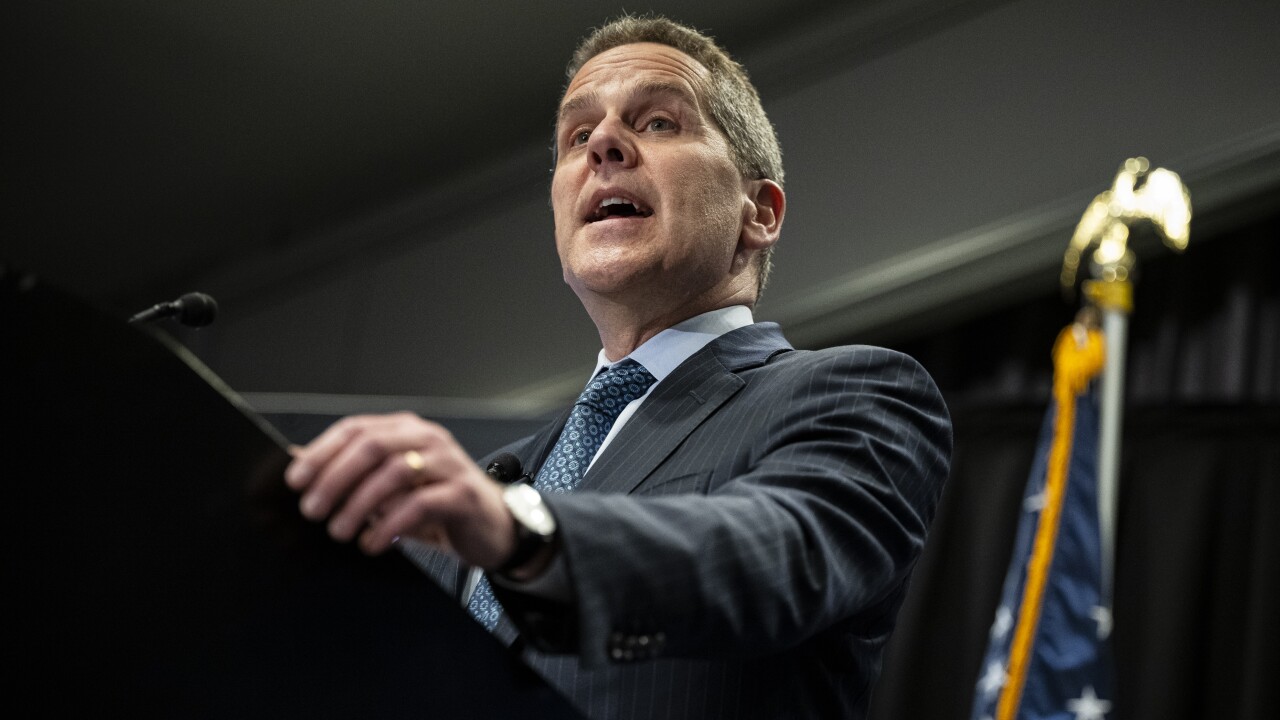-
The elections on Nov. 6 mostly delivered the status quo, but raised a host of questions about how lawmakers will tackle the fiscal cliff, big bank breakups and housing finance reform.
November 7 -
Elizabeth Warren, the CFPB architect and frequent bank critic, was elected late Tuesday to the Senate, much to the dismay of the financial services industry.
November 6 -
Speaking at the annual Best Practices in Retail Financial Services Symposium, U.S. Bank CEO Richard Davis and Citizens Republic CEO Cathleen Nash urged retail bankers to consider a proactive approach to new industry regulations.
March 14
BOCA RATON, Fla. – Elizabeth Warren, the architect of the Consumer Financial Protection Bureau, has long been a contender for the title of most hated woman in banking. This week, as
"I'm terribly sorry about sending Elizabeth Warren to the Senate," consultant Nick Miller quipped by way of welcome to an industry audience Thursday morning.
Miller is the president of Clarity Advantage, which is based in Concord, Mass. Warren defeated incumbent Massachusetts Sen. Scott Brown, a Republican, after a grueling and expensive campaign.
"It was close, but we just couldn't do it," Miller added Thursday, apparently apologizing on behalf of all Warren opponents who voted in his state – and perhaps on behalf of all the bankers who donated to Brown's campaign.
Miller was speaking at SourceMedia's annual
Some bankers were more pragmatic, or at least more resigned to Warren's election.
"She's but one vote," said Cathleen "Nash, the chief executive of Citizens Republic Bancorp, (CRBC), echoing reassurances made by some Warren watchers.
As a first-time Senator, Warren may have to build alliances and wait to gain more seniority before having much impact on policy. But she would increase her influence over financial services if she gets a seat on the Banking, Housing and Urban Affairs Committee, and industry members
Nash, who has long
"If you look at what the CFPB has done, and she laid the foundation, a lot of it is not bad stuff. Having clear credit card disclosures, clear mortgage disclosures, this is not bad stuff," Nash said in an interview. "Regulators play a really important role and I don't think Elizabeth Warren was wrong in a lot of the things she wanted to do."
But Nash also pointed out that the new Senator-elect has, at the very least, hurt a lot of feelings in an industry that feels under siege from many sides.
"I think Elizabeth Warren is part of a group that [thinks], ‘Banks are bad and must be managed, because look what happened.' And to a certain extent, she's not wrong – look what happened. So I think we're in the classic [case of] the pendulum swings too hard in the one direction … now it's going to swing too hard the other way. Eventually we find equilibrium," she said.
"I don't think [Warren's] an unreasonable person, I think she's very intelligent, I think she saw that the pendulum swung too far in the wrong direction, and she tried to swing it the other way," Nash added. "I don't know that that's bad, but what else could we expect given what happened? Whether my bank or your bank was part of it or not, you're going to get swept up in the tide."
Ginger Siegel, an executive vice president of business banking at PNC Financial Services Group, expressed similar sentiments.
"I think people have a bad idea of [the CFPB]," said Seigel in an interview, adding that she voted to re-elect President Obama.
Warren is "going to realize that she's going to have to come back to the middle ground and help," Siegel added. "I think that with most things, we react before we understand, and so I think we have to take a step back, and let's understand how these organizations help the people we really need to help. ... I think Elizabeth Warren has to do the same thing with banks. She's got to look to see what's the good part of banks."





